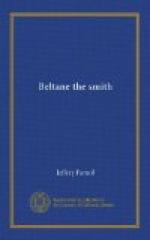Now at this Giles bowed his head and turning him about, went heavily upon his way. Then, sighing, Beltane arose and came where stood Sir Benedict who forthwith hailed him blithely:
“Can we but hold them until the dawn, Beltane—and mark me, we can, here is a work shall make us strong ’gainst all attacks,” and he pointed to the growing barricade. “But what of our noble Friar Martin? But for him, Beltane, but for him and his ancient company we had been hard put to it, lad. Ha, ’neath that white gown is saint and friar, and, what is better—a man! Now God be praised, yonder cometh the dawn at last! Though forsooth this hath been a sorry wedding-night for thee, dear lad—and for her, sweet maid—”
“Thou dost know then, Benedict?”
“Think ye not good Roger hasted to tell me, knowing thy joy is my joy— ha! list ye to those blessed joy-bells! glory be to God, there doth trusty Eric tell us he hath made an end of such as stormed the breach. But who cometh here? And by this hand, in tears!”
Already in the east was a roseate glory by whose soft light Beltane beheld Tall Orson, who grasped a bloody sword in one hand and wiped away his tears with the other. He, perceiving Beltane and Sir Benedict, limped to them forthwith and spake, albeit hoarse and brokenly.
“Lords, I do be bid hither to bring ye where he lieth a-dying—the noblest as do be in this world alive—his white robe all bloodied, lords, yet his face do be an angel’s face!”
“Ah,” sighed Beltane rising, “is it the noble Friar Martin, Orson?”
“Aye, lord, it do be he—as blessed me wi’ his poor hand as do be so faint and feeble.”
So saying, Orson brought them to a house beside the wall, wherein, upon a pallet, the white friar lay with Jenkyn beside him, and the white-haired Reeve and many other of the sturdy townsfolk about him.
Now came Beltane to kneel beside the friar, who, opening swooning eyes, smiled and spake faint-voiced:
“My lord Beltane—noble son, my work on earth is ended, methinks—so doth God call me hence—and I do go right gladly. These dying eyes grow dim—but with the deathless eyes of the soul I do see many things most plainly—so, dear and valiant children, hear ye this! The woes of Belsaye are past and done—behold, thy deliverance is at hand! I see one that rideth from the north—and this I give thee for a sign—he is tall, this man, bedight in sable armour and mounted upon a great white horse. And behind him marcheth a mighty following—the woods be bright with the gleam of armour! O ye valiant men—O children of Belsaye that I have loved so well, let now your hearts be glad! O Belsaye town, thy shames and sorrows be passed away forever. I see thee through the years a rich city and a happy, thy gates ever open to the woeful and distressed! Rejoice, rejoice—thy sorrows are past and done—even as mine. Ah, list—list ye to those bells! Hear ye not their joyful clamour—hearken!”




